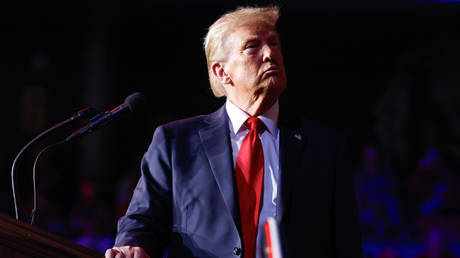
The US presidential candidate made a new controversial comment about the press just days before Election Day
US Republican presidential candidate Donald Trump seemed to suggest that he would not mind if his would-be assassin would have to shoot through “fake news” reporters covering his events. Trump, who has a longstanding feud with leading American news organizations, delivered his comments after surviving two assassination attempts this year.
The former president made his remarks at a campaign rally in Lititz, Pennsylvania on Sunday, two days before the election. During his speech, he noted that there were gaps in the panes of bullet-proof glass around him, and some of the reporters had a sight line through one of the gaps.
“I have this piece of glass over here, and I don’t have a piece of glass there,” Trump said. “But all we have really over here is the fake news, right? And to get me, somebody would have to shoot through the fake news.”
“And I don’t mind that so much,” Trump said. “I don’t mind. I don’t mind,” he repeated, eliciting laughter from the crowd.
At the same rally, Trump described news organizations as “seriously corrupt people.” He singled out ABC, CBS and NBC among the networks he did not like. “The media is so damn bad. It’s unbelievable,” he told supporters.
Following some backlash online, the Trump campaign spokesman, Steven Cheung, insisted that the Republican nominee’s remarks had “nothing to do with the media being harmed, or anything else.”
“It was about threats against him that were spurred on by dangerous rhetoric from Democrats,” Cheung said, arguing that Trump was making a point that reporters covering him “should have had a glass protective shield, also.”
Trump narrowly survived an attempt on his life in July, when a gunman opened fire at his rally in Butler, Pennsylvania. In September, another would-be assassin was arrested after hiding with a rifle at Trump’s golf course in Florida.
Trump has long accused media outlets of bias and spreading lies about him and his record as president. He, in turn, was often accused of incitement and, most recently, was criticized for labeling his political rivals an “enemy from within.”




